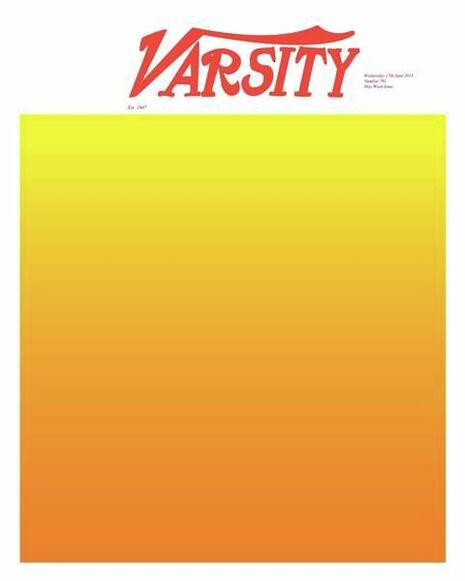Editorial: Are May Week and journalism both just products?
Will Hutton discusses the motives behind this year’s cover of Varsity’s May Week Issue

Like many traditions of Cambridge, May Week is sold as an ideal. An ideal of what hard work and determination can give us: champagne-soaked decadence at the best party in the world.
his ideal, however, is as wrong as the month May Week claims to be in. he limbo between the end of exams and the start of celebrations sees students swing between their beds and their college bars: where they will drink the life out of themselves all in the name of tradition. It’s what you do, right? Needlessly and heedlessly get into a wild state of Dionysian abandon – just because? It has its place, perhaps, as the presidents of drinking societies might tell you. But really, May Week is a simple idea behind May Ball tickets. And it’s something that countless covers of past May Week issues of Varsity and every other student newspaper have told us.
The idea behind this May Ball issue was something different. Acknowledging the heritage of May Week and Varsity, by using an old Varsity heading font, but giving the mood of May Week, rather than the ideal. he colour oscillates from yellow to red like the sun, rising in the east and setting in the west, never quite sure where it stands, or what it should be.
Journalism is similarly packaged as a glittering surface of superficially alluring headlines, promising empty notions of fun and sensation. Clickbait reels readers in with lurid headlines offering fun procrastination, but the articles offer nothing but vacuous fluff.
We’ve seen the Tab try things like ‘Procrasturbation’ and ‘If you’re not at Oxbridge you’re wasting your time’. Similarly, TCS has tried to offer lists of ‘Things to do in 3 hours instead of an exam’, in a truly BuzzFeed vein. And it strikes me that this is what the future of student journalism faces: the risk of provocation and pastiche. As the Guardian columnist-cum-BuzzFeed editor, Bim Adewunmi, told Varsity earlier this term: people aren’t afraid to be published online anymore. And as journalism accordingly shifts online, the number of likes a piece receives determines how ‘good’ it is. Just as the number of clicks determines what newspapers should be churning out. he old breed of broadsheet journalism, some claim, is careering towards obliteration.
As Peter Stothard, editor of the TLS and former Times editor, tells us in the interview in this issue: “It’s dangerous to abandon the whole of the heritage”, and the Times has proved that there is still a market for broadsheet journalism unreliant on clickbait. Despite Wikipedia founder Jimmy Wales declaring its paywall, “a foolish experiment”, it has moved the paper back to profit.
So both May Week and journalism can be redeemed, taken away from the superficial packaging of their commodification and imbued with the authenticity they deserve. We simply need to remember not to expect perfection, and instead just enjoy the music, the fireworks, the drinks and good company. A similar authenticity can be found in journalism through simple means. Broadsheets such as the Times and the Wall Street Journal have flourished by putting high-quality journalism behind online paywalls. For May Week and journalism alike, substance triumphs over style at their peril.
 News / Cambridge University disables comments following Passover post backlash 24 April 2024
News / Cambridge University disables comments following Passover post backlash 24 April 2024 Comment / Gown vs town? Local investment plans must remember Cambridge is not just a university24 April 2024
Comment / Gown vs town? Local investment plans must remember Cambridge is not just a university24 April 2024 News / Fitz students face ‘massive invasion of privacy’ over messy rooms23 April 2024
News / Fitz students face ‘massive invasion of privacy’ over messy rooms23 April 2024 Interviews / Gender Agenda on building feminist solidarity in Cambridge24 April 2024
Interviews / Gender Agenda on building feminist solidarity in Cambridge24 April 2024 Comment / Does Lucy Cavendish need a billionaire bailout?22 April 2024
Comment / Does Lucy Cavendish need a billionaire bailout?22 April 2024





